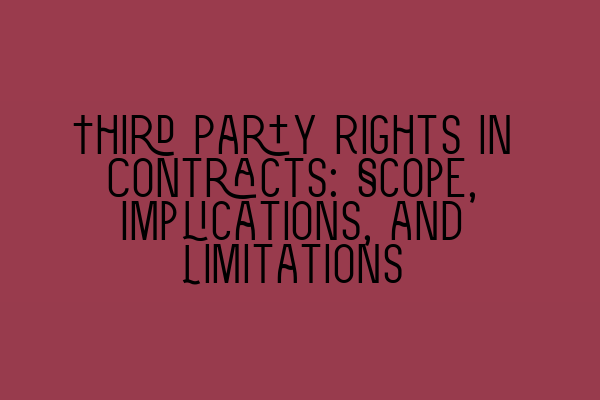Third Party Rights in Contracts: Scope, Implications, and Limitations
Contracts are an essential part of conducting business and establishing legal relationships between parties. When drafting a contract, it is important to consider the rights and obligations of the parties involved. However, what about the rights of third parties who may be affected by the terms of the contract? This blog post will explore the concept of third party rights in contracts, examining their scope, implications, and limitations.
Understanding Third Party Rights
Third party rights refer to the rights of individuals or entities who are not originally parties to a contract but may have an interest in its terms. These rights are recognized in certain circumstances and can arise either by express provision in the contract or by operation of law.
The Scope of Third Party Rights
The scope of third party rights can vary depending on the jurisdiction and the specific contract in question. In some cases, third parties may have the ability to enforce specific provisions of the contract that are intended to benefit them directly. This is known as a “beneficiary” or “privity of contract” situation.
For example, a contract between a contractor and a homeowner may include a provision stating that the contractor must provide a warranty to the homeowner’s future buyers. In this scenario, the future buyers would have the right to enforce the warranty directly against the contractor, even though they were not parties to the original contract.
Implications of Third Party Rights
The inclusion of third party rights in a contract can have significant implications for the parties involved. It is important to consider these implications carefully when drafting or entering into a contract.
From the perspective of the contracting parties, the existence of third party rights means that they may have additional obligations and potential liabilities beyond their original agreement. They must take into account the interests and rights of third parties when fulfilling their responsibilities.
For third parties, the recognition of their rights in a contract can provide them with legal protection and the ability to enforce their entitlements. This can be particularly beneficial in situations where the contracting parties may not be willing or able to fulfill their obligations.
Limitations on Third Party Rights
While third party rights can be advantageous in certain circumstances, there are limitations to consider. It is essential to understand these limitations to ensure that the rights granted to third parties are clear and enforceable.
One common limitation is the requirement for explicit language in the contract. In many jurisdictions, third party rights can only arise if the contract clearly indicates that the parties intended to confer such rights. This means that parties must expressly state their intention to grant benefits or rights to third parties.
Another limitation is the concept of privity of contract. In some jurisdictions, only those individuals or entities who are in direct privity of contract have enforceable rights. This means that third parties who are not specifically named or identified in the contract may not be able to assert their rights, even if they are intended beneficiaries.
Conclusion
Third party rights in contracts are a critical consideration when drafting and entering into legally binding agreements. They can provide additional protections and enforceable entitlements to those who are not directly involved in the contract but may be affected by its terms.
As a solicitor, it is essential to ensure that the inclusion of third party rights is clear and enforceable. By understanding the scope, implications, and limitations of such rights, you can protect the interests of all parties involved and minimize potential legal disputes.
If you are preparing for the SQE exams, check out our related articles:
– SQE 1 Practice Exam Questions
– SQE 1 Practice Mocks FLK1 FLK2
– SQE 2 Preparation Courses
– SQE 1 Preparation Courses
– SRA SQE Exam Dates
Remember, proper knowledge and understanding of third party rights in contracts will enhance your legal expertise and ensure you can effectively navigate this complex area of contract law.
